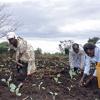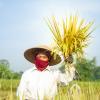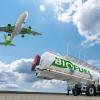
The fairSTREAM project just launched under the auspices of the IIASA Strategic Initiatives Program, aims to develop and demonstrate a co-production methodology for including equity and justice (fairness) alongside efficiency in developing sustainable policy options across the food-water-biodiversity nexus.
Conflicting views on what constitutes a fair outcome for sustainable development policies can jeopardize finding viable solutions for difficult development issues. This is especially true when it comes to the management and distribution of critical resources such as food and fresh water, and the conservation of biodiversity. Improving our ability to understand and reconcile our knowledge of what is fair, is therefore key to managing risks in this and other complex and rapidly changing nexus systems. Despite the obvious importance of this issue, the attention given to cost-effective solutions to major sustainability issues, such as reaching greenhouse reduction targets, reducing long-range air pollutants, and managing food and water systems, far outweighs the analytical attention given to understanding how fair such outcomes and processes are. This is a major challenge that requires a bottom-up approach, the integration of multiple sources of knowledge, and the cooperation of many different societal actors.
In an effort to remedy this situation, a new IIASA Strategic Initiative – the fairSTREAM project led by IIASA researchers Susanne Hanger-Kopp and Jens de Bruijn– will develop and demonstrate a co-production methodology for including fairness in developing sustainable policy options at the intersection of issues related to food, water, and biodiversity. The project will involve close collaboration between researchers from three IIASA research groups namely the Equity and Justice Research Group of the Population and Just Societies Program, and the Water Security and Biodiversity, Ecology, and Conservation Research Groups of the Biodiversity and Natural Resources Program.
The exact research questions will be formulated as part of the co-production process with stakeholders, and will include key questions of fairness at the food-water-biodiversity nexus. These may relate to distributive justice in the allocation of water for human use, biodiversity, and ecosystem preservation; procedural justice with respect to including all relevant stakeholders, particularly the role of women in water management, food production systems; and biodiversity management governance. Methodologically, the project will build on existing IIASA co-production processes that have been developed and implemented in previous projects and in different contexts.
“Working with a wide variety of people who will be affected by nexus policies brings different viewpoints and insights to producing the knowledge that will inform and underscore those policies. This provides a much more robust framework within which challenges may be overcome, while also providing an inclusive and just space within which actors can participate in science-based decision-making. Ultimately, this approach will require and enable IIASA researchers to align their expertise in co-designing participatory processes with those in quantitative modeling,” explains Hanger-Kopp.
While the project will take a global view methodologically, its application specifically focuses on the Bhima basin in India – a complex socio-ecological system experiencing multiple sustainability and equity challenges. The basin has significant value to agriculture and urban development while also boasting a notable biodiversity hub. At the same time, it has been exposed to droughts, floods, and declining groundwater levels. The challenge is to responsibly co-design and manage development trajectories in the region to ensure fair and sustainable use of shared resources and to prevent future lock-in.
“To support this process and to communicate issues of fairness at the individual level, we will also explore how we can use large-scale agent-based models coupled with a hydrological and biodiversity model to simulate more realistically the synergies and trade-offs at the farmer level,” notes de Bruijn.
In line with the IIASA strategic objectives of providing scientific support for challenges that require collaborative work and building capacity in systems thinking, the fairSTREAM project will foster institute-wide cooperation and cross-cutting research through the involvement of IIASA researchers in the project. The project will also provide ample opportunities for the institute’s National Member Organizations (NMOs) to participate in the transdisciplinary research process, encouraging involvement at conceptual co-design and implementation phases while strengthening NMO relationships and institutional co-production. Interested NMO representatives and IIASA researchers will have the opportunity to regularly gain insights through open-house project meetings, which will provide iterative and reflexive feedback loops for participants, ensuring both scientific excellence and practical relevance.
News

23 July 2024
Fostering transformation of agrifood systems in Indonesia

22 July 2024
Are sustainable aviation fuels truly sustainable?

17 July 2024


